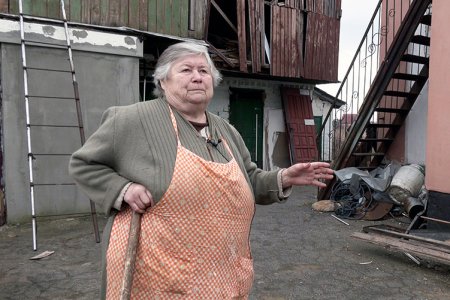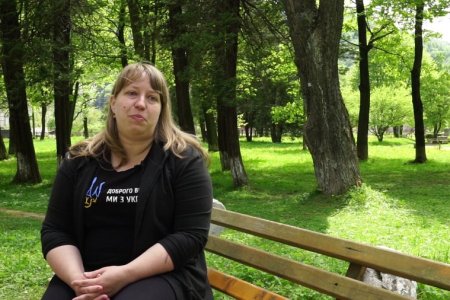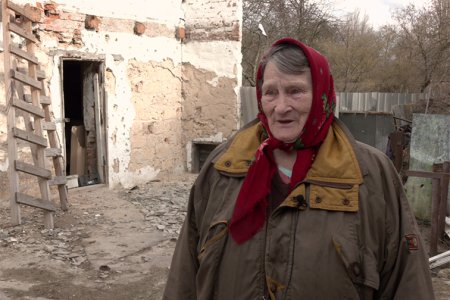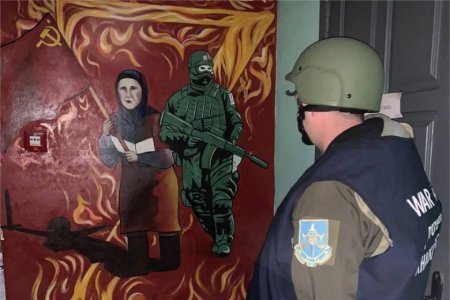I am a pensioner, and I am 66 years old. I live in the village of Zalissia. I am engaged in farming, growing vegetables and fruits for myself.
Who do you live with?
I live with my husband, who is 71 years old. There are children and grandchildren. They live in Kyiv. My daughter and granddaughter went to Poland.
Did you expect a full-scale war?
No! I didn’t believe it. It’s ridiculous, and I don’t know how to explain it. What is Putin missing? He also has small children — why should he look for trouble? I did not believe he would try to take over Ukraine and didn’t prepare. How can Putin do this if he is, one might say, one of the wealthiest people in the world? There will be punishment for this. Is he an enemy to himself and his country? I thought that he would get scared and retreat.
How was the first day of the war for you?
There was shooting and flying around! Boryspil is nearby, and it was bombed. At half past seven in the morning, it was already deafening here. It was hell. I saw shells in the sky, how they flew from Belarus to Kyiv. We looked with our mouths open. We were told to record everything. If we see anything, call. Well, I called and reported that rockets flew from Belarus. I said, there is one with the tail burning out in the sky. Anyway. On the first day of the attack on our village, on 8 March, we heard a terrible rumble. The earth trembled. We did not understand what it was, and it turned out the Russians began placing tanks here. We ran out of the forest and saw the tanks moving along the road. Then everyone understood what was going on. My neighbor called me and said that we were under occupation.
“Write down the phone. Everything you see will be passed on to this person. We are in occupation.” I asked: “What should we do? Where should we live? In the cellars? He answered: “Yes.”
This is how the first day of occupation passed. The Russians immediately went into my yard and began to destroy everything they could. Gates, fences, sheds — everything was destroyed. We had a tank right here, behind the barn, and the young guys were from Perm and Buryatia. The neighbor said that 20 units had entered. He counted them. And then, on 9 March, I don’t remember the time, because we were under stress, we saw a convoy to Kyiv along this road — over two hundred units. The soldiers sat on the equipment as if on a parade. They didn’t move and held their heads like this [proudly] like at a Kremlin parade. I saw this with my own eyes. They were going “to the parade” in Kyiv. So we thought Kyiv would be captured. There were a lot of armored vehicles. And military men with machine guns sat motionless on every armored personnel carrier and tank. You should have seen this picture. On the eighth, they came in, and we all hid in the cellars because they started shooting in all directions. On the first day, the bathhouse was shot. The projectile hit it. The house was burned next to us [across the road]. We saw how the village was on fire.
They dispersed throughout the villages when they were stopped in Skybyn, and the commander was killed. They separated and started tormenting people to quench their rage.
They fired back and hit the village. These — from Perm and Buryatia personally came to me and warned me about the mines here so that I would not go out. Not outside, not in the garden. They mined the garden and hung banners on the street. They were always with weapons. They even went to the toilet with weapons. We were shelled at night. We listened to the radio in the evening in the back room with a neighbor. I have a neighbor — an elderly woman, and we talked loud because we both are a bit deaf. But there was no noise or cars, so they heard [voices], they came and fired from a machine gun. Along the fence, long bursts of automatic weapons were fired! They spared no bullets. If I had been on the veranda, they would have killed me. They shot at the veranda and entrance doors. We got scared and quieted down.
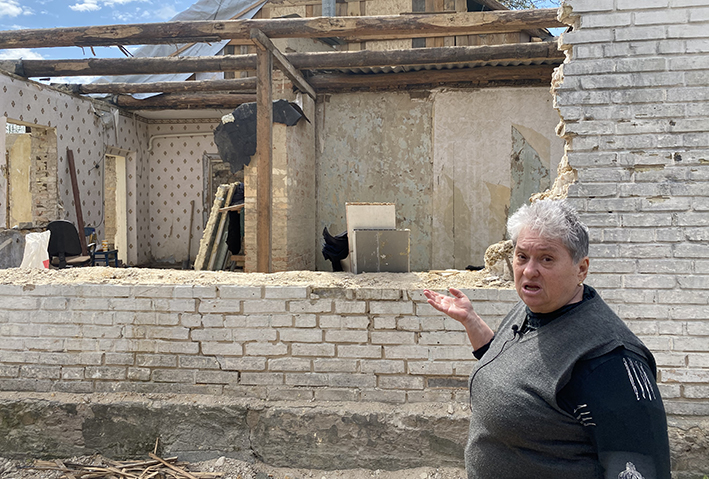
Tell me about the occupation.
How did we get through this?! The Russians did not allow us to go outside. I wanted to go to my sister (she is blind), I went out, and he said: “If you want to walk along the street, put on a red armband as we do.” And I didn’t want to be like them. He escorted me because there were snipers on the roofs. He said: “You do not go alone, or they will kill you.” He took me to my sister through three houses, but she was no more.
The sister was dead. Nobody buried her. They just said the old lady had died.
I asked: “What should I do?! I want to bury her.” And he answered: “We will take the body to the forest and bury it.” I said: “Please don’t do this! Let’s bury her in the garden. No need to bury her like a dog!” My sister was born on March 8, 1942. She died from not having food or water from cold and hunger on the house threshold. And I was not allowed to go there.
They escorted me there only on 19 March. But I never made it to the house. My sister’s neighbor came out and said everything was mined and it’s better not to go in. I said: “At least show me whether she is alive or not!” I returned home with nothing. I went out to the garden with the phone, looking for connections. They damaged everything: all the lines and so on. However, there was a spot in the garden. I called the neighbors and everyone I could get through, saying we were alive and had not yet been killed. And we are not starving yet because there are stocks of potatoes in the cellar. While I was reporting, they [the Russians] pointed their machine gun at me. I began to wave my hand so that they would not shoot so that they would not kill. That’s what they did. We were hiding; that’s why we survived.
We lived in cellars, very cold cellars. We suffered a lot, got sick, and we still ill today. And some young people died.
After all, I only lived in the cellar for two weeks, but some people endured four weeks without water and food. Different things happened here. The bodies lay there for a very long time. It’s good that it was minus 10-12 degrees [Celcisus], and they didn’t decompose. Bodies lay covered on the pavement. Civilians, of course, civilians! Cars with civilians were driving, and then the tanks came in and shot them. This is where the guy died. He went out in a car, and they shot him. My sister was buried when the territory was liberated. Our Zalesye was liberated on 28 March, and she was buried in early April. I tell you, it was cold, and the frosts were severe; that’s why the body was preserved.
How long were you in occupation?
We were there for two weeks, and then I left my yard and saw the tankers standing nearby. I said: “Can I talk to the commander and ask them to let us out through the green corridor?” But they didn’t want to let us go. We were human shields. These tankers were not aggressive toward us because they knew they were trapped. They were surrounded, logistics were cut off, and they had nothing to eat. They walked through empty yards and cleaned the cellars. One came to me and asked for potatoes. His name was Maxim. He said: “Grandma, give us a bucket of potatoes; we have nothing to eat. Nothing has been delivered, and we are surrounded.” When I heard it, I was so happy! And what euphoria I had, what happiness when they were defeated in Skybyn: a column of 200 units. They flew back at such speed! Eighty kilometers per hour, that’s how they flew.
They fled and spread through the villages. And it was such happiness! Such a thrill — you have no idea!
Because the enemy has come and rode with machine guns and heads proudly raised. They were calm, but we panicked. We thought — that’s it! Kyiv will be surrendered, and we are finished. And then these tankers returned — the very ones who destroyed everything around us and went to take Kyiv. And this Maksym from Perm said: “It’s a pity, we were promised that in three days we would parade through Kyiv and go home. We’ve been here for a month now.” I asked: “Do they pay you money?” — “Yes, $75 a day.” — “You will be fooled. They won’t give you money.” “No,” — he says, “they transferred everything to my card,” — I told them to surrender: “They will beat you. And both sides will get it !” He said that they would have surrendered but for the commander. Until recently, he kept them here.
How did you manage to escape?
The Russians did not allow us to leave; they lied there was no corridor. I said: “Let us go anyway. Please allow us to go!” Well, they allowed it. They were surrounded and therefore did not rage. However, we tried to keep down and lived in cellars…
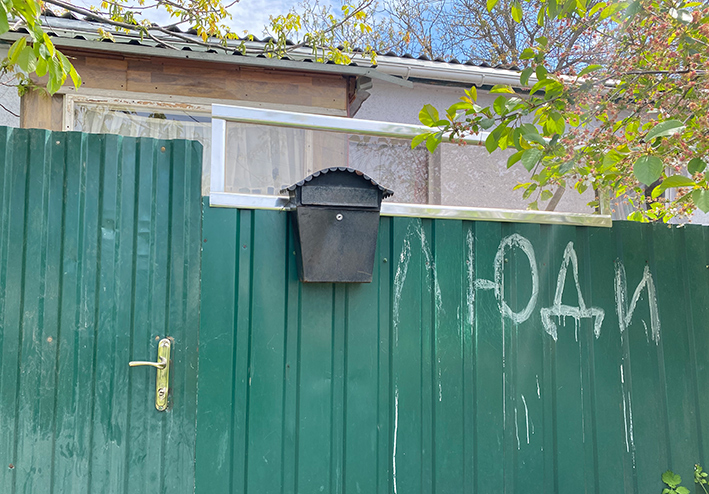
They let us go. We are pensioners. I organized the trip with a friend. We were in three cars, and the children were evacuated. The boy was seven years old, and he also lived in the cellar. He started wetting and is now being treated and given antidepressants.
Where did you go?
To the neighboring village, Bohdanivka. There was a huge column and a green corridor managed by the Red Cross. But all the same, the Russians intimidated us and fired from tanks. There were a lot of people there: children, cars, everything. And the Russians had fun — they shot. We passed, but it was terrifying. Then I left for Kyiv. We stayed there for a long time until we were allowed to return. There were mines all around, F-1 grenades, and vegetable gardens were mined. We were not allowed to return until everything was cleared of mines and the houses were checked. Somewhere in the middle of April, we returned.
What about your property?
The house is wrecked. Half of the house is broken, including the roof and windows. But nothing was stolen from me. First of all, I talked to them. I told them not to steal because they can’t get rich here — the village is poor, and the wealthy don’t live with us. I said: “God sees everything, and it will be a curse for you and your children.” I carried on “propaganda” with them and told them about our country and the president. I talked a lot, and they listened. They didn’t like our president. I said, well, you love yours, you chose him, and we will love ours, whom we chose. He is good for us. I did not treat them with aggression. If I had said something wicked, I would probably have been shot. I told them about our state, about the army, which we have up to a million. The whole world is arming us with the best weapons. And he answered: “You don’t have the army. You have NATO troops.”
“No, son,” — I said, — “it’s not true. You understand that we have been fighting for eight years, and our army is strong and experienced. You will be destroyed or get captured. You are young, and I feel sorry for you. You’ve been fooled."
And he said: “We would gladly surrender, but they will shoot us in captivity.” — “No executions. They would treat and feed you. We adhere to the international protection convention.” I did not expect to be such a propagandist of my country and have such talents. It’s probably all from stress. Every day we met and talked through the fence. It was impossible to go outside and to the garden too. And through the fence, I called them, or they would come up. They didn’t understand anything. Limited people. They told me: “You have fascists and Nazis.” I answered: “No, we don’t have them. Half of our villages are Russians. For example, I have a father from the Altai Territory, the village of Maima, and the Surtaika River — my surname is Surtaieva. Maybe there are many of my relatives among you. Is there anyone from there?” They quieted down, and I asked: “Whom did you come to liberate? From what? We have our president. We live well. Everything is fine with us. We don’t need to be freed.” And he again: “You have fascists, Nazis, and Banderites [Ukranian Nationalists]. If we surrender, they will shoot us.” I said: “That’s not true! Sons, no one will be shot!” So we communicated.
What’s up with your house?
A mine exploded, and this is where her tail lay. When they retreated, they bombarded everything they could with mines. The road was covered on both sides. The most terrible was the shells: they flew from the west, east, north, and south — from all sides. It was hell! Our village is not included in the list of towns with active hostilities, but I don’t know what to call it. It was occupied, and it was a hot spot here.
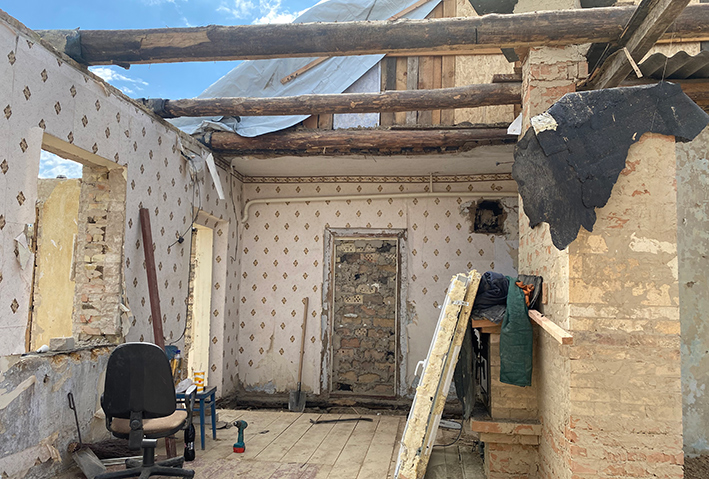
They fired heavily. Luckily the house didn’t burn down. Look, here everything is made of wood: the floors and everything. Great luck that it did not burn.
Tell me about your village.
We had a hamlet with 130 farmsteads, and there were many children.
How many houses have been destroyed?
In percentages? More than 50%. A lot of houses were severely damaged. That part of the village is completely destroyed. We were nobody and nothing here. We had no right to go out into the street or the garden. “Sit in the cellars! Hide! Hide!” And they went everywhere, rode ATVs, had fun, and were very happy while we hid. Everything in the abandoned houses was taken away, like our godfather’s house opposite, who left earlier. They grabbed all the meat and everything else. They wanted to eat. At first, they actively fired at the drones from machine guns, and then the ammunition ran out. They also heated their tanks to escape the frost. Then they started saving everything. There were no resources either.
What are you planning to do next?
What are the pensioners’ plans? I don’t even know. I am waiting for the Victory and dream it will be this year. I really hope it will be over this year. These are my dreams. And that’s all.
Has your attitude towards Russians changed?
It changed! In principle, I have no hatred, but anger and hatred appeared after they shot people in Uman. Because no one does such things — these are barbarians! They are worse than Hamas. I don’t even know who to compare them to. These are nonhumans! The occupation was terrible, and the shelling was intense. Where did they shoot? Two hundred pieces of equipment were dispersed in the villages, and they satisfied their rage: they fired and frightened us. They burned and destroyed.
